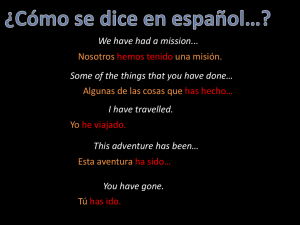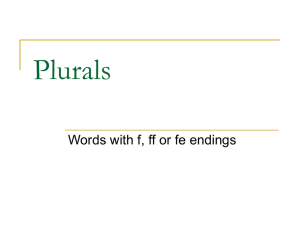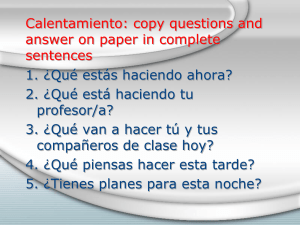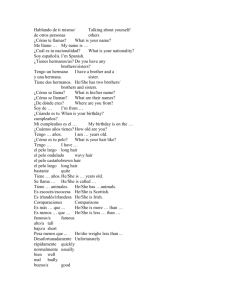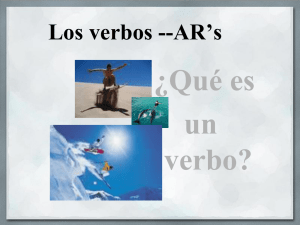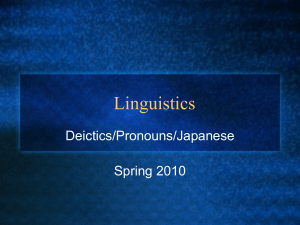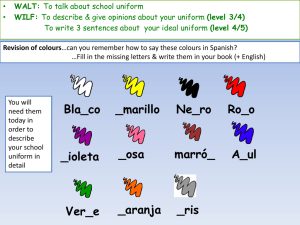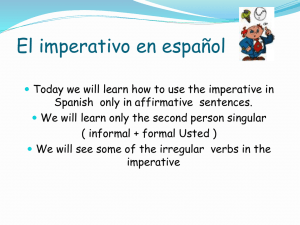Year7SpanishBooklet_60pageversion
advertisement
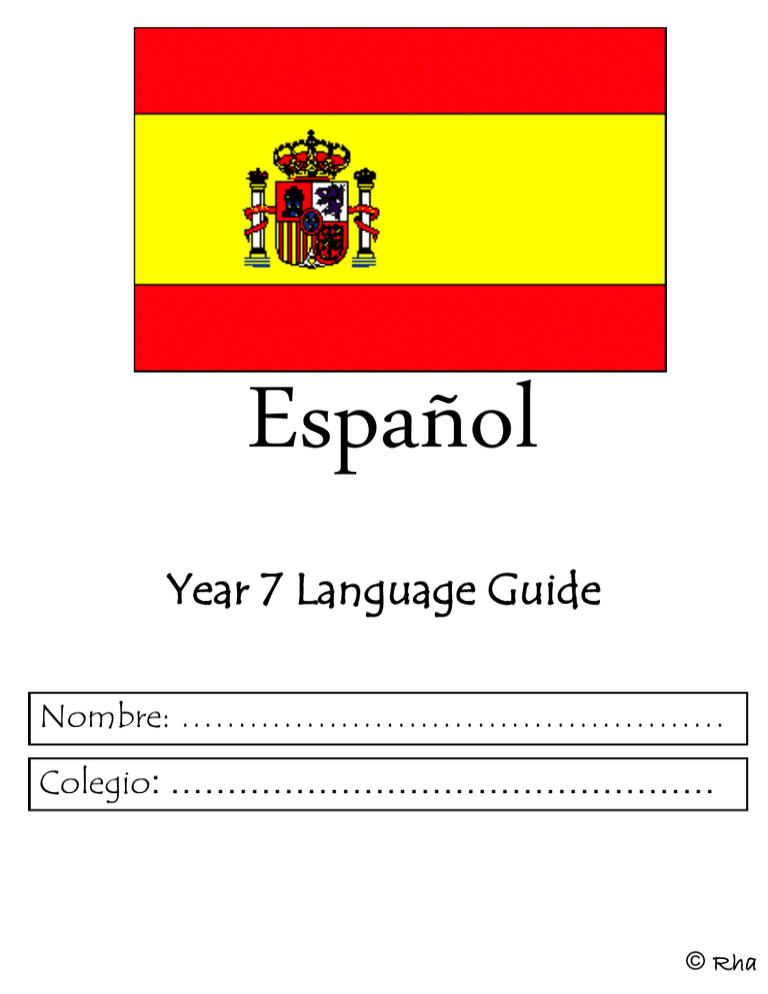
Español
Year 7 Language Guide
Nombre: …………………………………………
Colegio: …………………………………………
© Rha
Contents
Phonics
3
Physical description
30
Pronunciation tips
4
Character description
31
Core Language
5
School subjects
32
Year 7 Progress: Levels
6
Opinions
33
Year 7 Progress: Skills
7
GUSTAR and Likes & Dislikes
34
Year 7 Tick grid
8
Food & drink
35
Greetings / Introductions
9
Time
36
Questions & question words
10
Useful verbs & phrases
36
Useful phrases
11
My school
37
Sentence-building practice
11
Teachers & transport
38
Numbers
12
Daily routine
39
Classroom objects/Colours
12
Sports
40
Months/Days of the week
14
Free time
41
Parts of the body
15
Weekend
42-3
Map of Spain
16
IR & HACER
44
Countries
17
Simple future
45
Nationalities
18
In town
46
Languages
18
Direction
47
ABC & a/the
19
Describing your town
Describing places
48-9
20-2
Weather
50
Adjective rules
23
Seasons
51
Prepositions
24
Radical-changing verbs
52
Pronouns
25
Verbs
53-56
Present tense (happy verbs)
26
Vocabulary & Websites
57-60
SER/ESTAR/TENER/HAY
27
Animals
28
Family
29
2
3
4
idea
1
araña
5
elefante
6
universo
9
7
cerdo
10
coche
13
España
olvidar
ciclista
11
cucaracha gimnasia
14
zumo
15
guitarra
8
casa
12
hamburguesa
16
llave 3
Tips for pronouncing Spanish
The good news about Spanish pronunciation is that it obeys clear
phonetic rules, although people do speak with different accents,
depending on their region and background.
Vowels
Each of the five vowels has its own clear sharp sound:
a as in hat
e as in pet
i as in feet
o as in clock
u as in drew
c's and z's
c + e = th
c + i = th
z + a, o, u = th
c + a = ka
c + o = ko
c + u = ku
cero, once
cinco, gracias
zapato, corazón, azul
casa, catorce
cómo, color
Cuba, cubano
j's and g's
J, as in jardines (gardens), is a harder, stronger version of the English
'h'. G, when followed by e and i, sounds exactly the same as j.
Otherwise, it is pronounced as the English 'g' in go.
ll's
The double ll, as in calle, is another characteristic Spanish sound. In
most parts of Spain it's like the 'lli' in the English million.
h’s
The h is silent in Spanish, so you won’t be blowing any candles out
when you pronounce words that begin with this letter. Best to imagine
it’s not there and pronounce the second letter in the word.
hablo, helado, ¡hola!, huevo
4
KS3 Spanish Core Language
tener – to have
Pronouns
yo – I
tú – you
él/ella – he/she
Usted – you
(polite, sing.)
nosotros – we
vosotros – you
(fam.pl.)
ellos/ellas – they
Ustedes – you
(polite, pl.)
ser – to be
tengo
I have
soy
I am
estoy
I am
tienes
you have
eres
you are
estás
you are
tiene
he/she has
you have
es
he/she is
you are
está
he/she is
you are
(pol.sing)
(pol.sing)
tenemos
we have
somos
we are
tenéis
you have
sois
you are
(fam.pl.)
they/you
tienen
Time words
have (pol.pl.)
ahora – now
antes – before
Referring to things
después – after
hoy – today
una cosa – a thing
ayer – yesterday
esto – this
mañana – tomorrow
eso – that
otra vez - again
algo (más) –
siempre – always
something (else)
a menudo – often
otro – (an)other
a veces – sometimes
mucho – a lot
nunca – never
(un) poco – (a) little
la semana pasada –
muy – very
last week
todo –
la semana que viene
all/everything
– next week
puedo/puede
estar – to be
son
(pol.sing)
estamos
we are
(fam.pl.)
estáis
you are
they/you
are (pol.pl.)
están
they/you
are (pol.pl.)
Referring to places
aquí – here
allí - there
Making links
(fam.pl.)
Asking questions
¿Por qué? – why?
¿Qué? – what?
¿Cuándo? – when?
¿Dónde? – where?
¿Quién? – who?
¿Cuánto(s)? – how
much/many?
¿Cómo? – how?
y – and
o – or
también – also
pero – but
Opinions
porque – because
con – with
Pienso que – I think that
sin - without
Creo que – I believe that
Me parece que – it seems
Sentence building
that..
I can/he,she can
quiero/quiere
I want to/he,she wants to…
tengo que/tiene que
I have to/he has to…
voy a/va a
+ verb
I’m going to/he is going to…
(no) me (le) gusta
I (don’t) like to/he doesn’t like to
me (le) encanta
I love to/he loves to…
me (le) gustaría
I/he/she would like to…
Saying what you did
fui – I went
hice – I did
ví – I saw
jugué – I played
comí – I ate
bebí – I drank
5
Year 7 Progress: Levels
5
5
5
5
5
5
5
5
5
5
5
5
4
4
4
4
4
4
4
4
4
4
4
4
3
3
3
3
3
3
3
3
3
3
3
3
2
2
2
2
2
2
2
2
2
2
2
2
1
1
1
1
1
1
1
1
1
1
1
1
L
S
R
W
I can understand
the main points
and opinions
from a longer
spoken passage,
which includes
reference to
present and
past or future.
I can give a
short,
prepared talk,
expressing my
opinions and
referring to
present and
past or future
events.
I can
understand the
main points
and detail in
written texts
in various
contexts,
including
present and
past or future.
I can write a
short text on a
range of familiar
topics, using
simple
sentences, and
referring to
present and past
or future
events.
I can
understand the
main points
and some of
the detail from
a short spoken
passage.
I can take part
in a cimple
conversation
and give my
opinions. My
pronunciation
and intonation
are generally
good.
I can
understand the
main points
and some
detail from
short written
texts. I use
context to help
me deduce
meaning.
I can write a
short text on a
familiar topic,
adapting
language I know.
I use memorised
language well.
I can ask and
answer simple
questions and
talk about my
interests.
I can
understand the
main points
from a short
written text. I
am able to use
a dictionary
with more
confidence.
I can write a
few sentences
with support,
using language I
have learnt. My
spelling is
understandable.
I can
understand a
range of
familiar words
and phrases.
I can answer
simple
questions and
give back basic
information.
I can
understand and
read out
familiar
written
phrases. I can
use a
dictionary to
look up new
words.
I can copy a
model to write 1
or 2 short
phrases and
complete the
words on a
simple form.
I can
understand a
few familiar
spoken words
and phrases.
I can say and
repeat words
and short,
simple phrases.
I can recognise
and read out a
few familiar
words and
phrases.
I can write or
copy simple
words
correctly.
I can
understand the
main points
from a short
spoken
passage.
6
Year 7 Progress: Skills
{
{
{
{
I can read
text
accurately
that has
new
language
in it
I can use I take part
I can use
I set
I can use all
the
strategies
confidently
myself
the sentencelanguage
to
in
role
building
targets &
memorise support on the I’ve learnt
plays in
try to
to make an front of
CL sheet to
& give a
meet them
short talk write a short activity for the class
my class
text
I can
remember
how to
pronounce
words
correctly
over time
I take part
I can use
3 times
I can adapt
I ask
strategies I can use the
per lesson questions
the
linking words
to
language I in whole
about
on the CL
memorise sheet to write
class
know to
language &
single
a short
create a interaction respond to
words &
paragraph
(corap/song
my targets
sentences
teacher)
In class &
I can
at home I
repeat
new words can sort
accurately out which
words I
& make
know and
links to
phonics don’t know
I know how to
use different
parts of
‘tener’, ‘ser’,
& ‘hay’ to
build my own
sentences
In class I
I can adapt
actively
I have
model
use
music,
sentences
by
learnt the
song,
changing 1
phonics &
remember gesture & or 2 words
to make new
the sounds colour to
meanings
help me
memorise
I can use
I can look
the
I talk
up new
language I confidently
words
know to
in paired
describe a dialogues confidently
in a
photo
in class.
dictionary
I can use
I can
individual
memorise
words to
create a & perform
a song in
poem
following a Spanish.
model
I get
started
straight
away on a
new task
7
Year 7 Tick grid
?
Present (reg)
Present (tener,
ser, hay, estar)
adjectives
links
questions
opinions
reasons
negatives
Present (rad ch)
Future (ir a)
spelling errors
}
}}
We will focus on these 4
during the Autumn Term.
We will add these during the
Spring Term and combine with
the first 4.
We will add these during the Summer
Term and try to produce speaking and
writing that includes all these elements.
It’s always important to keep the
number of spelling mistakes to a
minimum!
What is the tick grid?
The tick grid is a tool to help you plan a piece of speaking or writing. You
use it to decide what language to use in your work. It is also used by the
teacher to mark your work and give you helpful information, for example,
how many of each language element you tried to use and how many
attempts were successful. It helps you to see clearly how you could improve
on each piece for the next time.
What is the ? column for?
When you plan your work, your teacher will decide with you how many
examples of each element you want to include. You write the number in the
space provided.
What are the smiley/sad faces for?
Your teacher will put a line for each correct attempt in the smiley column
and one for each unsuccessful attempt in the sad face column. It’s always
better to have a mark in the sad face column than a complete blank.
8
Como saludar
Greetings
¡Buenos días!
Good morning
¡Buenas tardes!
Good afternoon
¡Buenas noches!
Good evening
¡Hola!
Hello
¡Adiós!
Goodbye
¡Hasta luego!
bye
Por favor
please
Gracias
thank you
¿Cómo estás? OR ¿Qué tal?
How are you?
¿Cómo está Usted?
How are you? (formal)
Estoy…..
I am…
fenomenal
great
bien
good/fine
regular
ok
mal
bad
¡fatal!
awful
¿Cómo te llamas?
What’s your name?
Me llamo….
My name is…
Vivo en…...
I live in…..
Tengo…. años
I am ……years old.
Mi cumpleaños es el….de…..
My birthday is on the …..of…
Soy inglés / inglesa
I’m English
Tengo un(a) hermano/a
I have a brother (sister)
Mi hermano/a se
llama………
My brother (sister) is called..
Soy hijo/a único/a
I’m an only child
9
Preguntas
Questions
¿Dónde?
Where?
¿Quién?
Who?
¿Cuándo?
When?
¿Qué?
What?
¿Cómo?
How?
¿Por qué?
Why?
¿Cuánto?
How much?
¿Cuántos?
How many?
¿Cuál(es)?
Which?
¿Cómo te llamas?
What is your name?
¿Cuántos anos tienes?
How old are you?
¿Dónde vives?
Where do you live?
¿Cuándo es tu cumpleaños? When is your birthday?
¿Tienes hermanos?
Do you have brothers and
sisters?
¿Cómo se llama tu
hermano?
What is your brother
called?
¿Cómo se llama tu
hermana?
What is your sister called?
¿Cuántos anos tiene?
How old is s/he?
¿Te gusta…?
Do you like……?
10
Frases útiles
Useful phrases
Me gusta
I like
No me gusta
I don’t like
Me encanta/me chifla
I love
Detesto/odio
I hate
Prefiero
I prefer
porque
because
Es/no es
It is/ it isn’t
Hay/ no hay
There is/are There isn’t/aren’t
muy
very
bastante
quite
¿Puedo hablar en inglés?
Can I speak in English?
¿Cómo se dice ..en español?
How do you say … in Spanish?
¿Puedes repetir?
Can you repeat?
¿Qué es …. en inglés?
What is…..in English?
tengo un problema/una idea
I have a problem/idea
he olvidado
I’ve forgotten
¡es fenomenal!
It’s great
fatal/verdad/mentira
terrible, right, wrong
Gracias
Thank you
De nada
Don’t mention it
Quisiera
I would like
Tengo/ No tengo
I have / I don’t have
No entiendo
I don’t understand
Necesito…
I need
11
Cardinal and ordinal numbers
1
2
3
4
5
6
7
8
9
10
11
12
13
14
15
16
17
18
19
20
21
22
23
24
25
26
27
28
29
30
31
un(o) / una
dos
tres
cuatro
cinco
seis
siete
ocho
nueve
diez
once
doce
trece
catorce
quince
dieciséis
diecisiete
dieciocho
diecinueve
veinte
veintiuno
veintidós
veintitrés
veinticuatro
veinticinco
veintiséis
veintisiete
veintiocho
veintinueve
treinta
treinta y uno
10
diez
100
cien
20
veinte
200
doscientos
30
treinta
300
trescientos
40
cuarenta
400
cuatrocientos
50
cincuenta
500
quinientos
60
sesenta
600
seiscientos
70
setenta
700
setecientos
80
ochenta
800
ochocientos
90
noventa
900
novecientos
1000 - mil
1458
mil cuatrocientos cincuenta y ocho
2000
dos mil
1,000,000
un millón
2,000,000
dos millones
primero
first
segundo
second
tercero
third
cuarto
fourth
quinto
fifth
sexto
sixth
séptimo
seventh
octavo
eigth
noveno
nineth
décimo
tenth
12
En mi mochila
In my school bag
una agenda
a diary
una carpeta
a folder
una goma
a rubber
una pluma
a pen
una regla
a ruler
una tijera
a pair of scissors
un bolígrafo
a pen
un cuaderno
an exercise book
un diccionario
a dictionary
un estuche
a pencil case
un lápiz
a pencil
unos lápices
some pencils
un libro
a book
un sacapuntas
a pencil sharpener
Los colores
The colours
azul
blue
verde
green
marrón
brown
gris
grey
negro/a
black
blanco/a
white
rojo/a
red
amarillo/a
yellow
de color rosa
pink
de color naranja
orange
de color violeta
purple
13
Los meses del año
The months of the year
enero
January
febrero
February
marzo
March
abril
April
mayo
May
junio
June
julio
July
agosto
August
septiembre
September
octubre
October
noviembre
November
diciembre
December
Los días de la semana
The days of the week
lunes
Monday
martes
Tuesday
miércoles
Wednesday
jueves
Thursday
viernes
Friday
sábado
Saturday
domingo
Sunday
14
Las partes del cuerpo
The parts of the body
la garganta
throat
la cabeza
head
la espalda
back
la mano
hand
la pierna
leg
la rodilla
knee
la nariz
nose
las muelas
(back) teeth
las orejas
ears
el estómago
stomach
el brazo
arm
el dedo
finger
el pie
foot
los dientes
(front)teeth
los ojos
eyes
los oídos
(inner) ears
me siento mal
I feel ill
me duele la cabeza
My head hurts
me duelen las muelas
My teeth ache
tengo calor
I’m hot
tengo frío
I’m cold
tengo tos
I have a cough
tengo fiebre
I have a temperature
tengo gripe
I have flu
tengo catarro
I have a cold
estoy enfermo/a/ or estoy mal
I’m ill
15
España
norte
noreste
noroeste
oeste
centro
este
suroeste sur sureste
16
Los países (Countries)
Vivo en…
I live in
¿De dónde eres?
Where are you from?
Soy de….
I am from…
Australia
Australia
Escocia
Scotland
España
Spain
Francia
France
Alemania
Germany
Italia
Italy
los Estados Unidos
The United States
Gales
Wales
Inglaterra
England
Irlanda
Irland
México
Mexico
Nigeria
Nigeria
Paquistán
Pakistan
Jamaica
Jamaica
Mozambique
Mozambique
África del Sur
South Africa
17
La nacionalidad (Nationality)
Soy ….
I am..
argentino/a
Argentinian
australiano/a
Australian
chileno/a
Chilean
mexicano/a
Mexican
nigeriano/a
Nigerian
jamaicano/a
Jamaican
escocés / escocesa
Scottish
galés / galesa
Welsh
inglés /inglesa
English
irlandés/irlandesa
Irish
francés/francesa
French
español /a
Spanish
alemán/a
Germany
estadounidense
American
paquistaní
Pakistani
Los idiomas (languages)
¿Qué idiomas hablas?
Which languages do you speak?
el idioma
language
los idiomas
languages
Hablo….
I speak…
castellano
castillian Spanish
valenciano
valencian Spanish
catalán
Catalan
gallego
galician Spanish
italiano
Italian
japonés
Japanese
18
How to say ‘a’, ‘some’ and ‘the’: definite and indefinite articles
un
a (masculine object)
una
a (feminine object)
unos
some (more than one masculine object)
unas
some (more than one feminine object)
el
the (masc object)
la
the (fem object)
los
the (more than one masc object)
las
the (more than one fem object)
NB: Sometimes the article is not needed in Spanish:
e.g. No tengo hermanos = I haven’t any brothers or sisters
e.g. Mi padre es profesor = My dad is a teacher
El abecedario español
A
a
J
jota
R
erré
B
bé
K
ka
S
essé
C
thé
L
ellé
T
té
D
dé
M
emé
U
oo
E
é
N
ené
V
oobé
F
effé
Ñ
eñé
W oobé doblé
G
jé
O
o
X
ekees
H
aché
P
pé
Y
ee griega
I
ee
Q
koo
Z
theta
NB: ch and ll are
no longer separate
letters in the
Spanish alphabet
but you still might
see them in older
dictionaries.
In Spanish most
words are written
as they are said –
you just need to
know the key
sounds!
19
La geografía física (physical geography)
el lago
lake
la tierra
earth/ground
el río
river
la montaña
mountain
el estuario
estuary
la colina
hill
el cielo
sky
la costa
coast
el glacial
glacier
la bahía
bay
el arroyo
el riachuelo
stream
la nube
cloud
el valle
valley
la ola
wave
el precipicio
precipice
la playa
beach
el acantilado
cliff
la vegetación
vegetation
el cabo
el golfo
coastline
la cascada
waterfall
el trueno
thunder
la lluvia
rain
el relámpago
lightening
la llanura
plain
los árboles
trees
la hierba
grass
las plantas
plants
20
La geografía humana (human geography)
el pueblo
village
la ciudad
town/city
el castillo
castle
la granja
farm
el puerto
port
la aldea
village
el edificio
building
la industria
industry
el puente
bridge
la oficina
office
el tráfico
traffic
la tienda
shop
el oleoducto
pipe line
la casa
house
el piso
flat
la autopista
motorway
el humo
smoke
la calle
street
el aeropuerto
airport
la carretera
road
el restaurante
restaurant
la basura
rubbish
el trabajo
work
la fábrica
factory
el ferrocaril
railway
la cosecha
harvest
el reciclaje
recycling
la chiminea
chimney
el hotel
hotel
la gente
people
el embalse
reservoir
la torre
tower
21
Adjetivos para describir un lugar (adjectives to describe a place)
empinado
steep
llano
flat
alto
tall/high
bajo
small/low
claro
light
oscuro
dark
profundo
deep
poco profundo
shallow
ruidoso
noisy
tranquilo
peaceful
contaminado
polluted
no contaminado
unpolluted
sucio
dirty
limpio
clean
divertido
fun
aburrido
boring
bonito
pretty
feo
ugly
precioso
beautiful
asqueroso
disgusting
calmado
calm
tormentoso
stormy
planeado
planned
improvisado
unplanned
ocupado
busy
vacío
empty
caluroso
hot
frío
cold
recto
straight
torcido
twisted
rico
rich
pobre
poor
brillante
shining
mate
matt
grande
big
pequeño
small
enorme/
gigantesco
enormous
minúsculo
tiny
puntiagudo
jagged
suave
smooth
brumoso
misty
soleado
sunny
serpenteado
meandering
derecho
straight
NB: Most of these adjectives end in ‘o’. When describing a
feminine word (‘la’) you change the ‘o’ to ‘a’. Adjectives ending in
‘e’ stay the same.
22
Rules about adjectives
An adjective is always describing something, and that word is a noun.
In Spanish you have to look at the noun’s gender and number and then
decide whether the adjective you are using needs to change.
Agreement
The adjective should have the same number and gender as the noun it
describes. Sometimes the adjective does not have to change. The two
rules for deciding are as follows:
if the adjective ends in –o then the o must change to a if the noun
it describes is feminine;
if the adjective ends in any other letter do not change it — except:
if the adjective describes the nationality or regional origin of the
noun, then it must be made feminine if the noun it describes is
feminine;
if the noun is plural, the adjective should be made plural too.
For example:
singular
plural
masculine
feminine
masculine
feminine
short
bajo
baja
bajos
bajas
blue
azul
azul
azules
azules
English
inglés
inglesa
ingleses
inglesas
Position
In sentences where the noun and the adjective come next to each
other, in Spanish it is the noun which comes first, usually. In English it
is the other way round. For example:
We have a blue car
A big garden
The tall girls
Some difficult lessons
Tenemos un coche azul
Un jardín grande
Las chicas altas
Unas clases difíciles
There are very few cases where the word order is the same as in
English. We will learn about those in year 9!
23
Prepositions
These are the most commonly used positioning words:
a
to, at
con
with
de
from, of
desde
from, since
en
in, on
entre
between
hacia
towards
para
for
por
for, because of
sin
without
sobre
on, about
al final de
at the end of
alrededor de
around
cerca de
near to
delante de
in front of
dentro de
inside
detrás de
behind
encima de
on top of
enfrente de
facing, opposite
fuera de
outside
lejos de
far from
24
Subject pronouns
tú
yo
él
Usted
yo
I
tú
you (singular familiar)
él
he
ella
she
Usted
ella
you (singular formal)
nosotros
we
vosotros
you (plural familiar)
ellos
they (masculine)
ellas
they (feminine)
Ustedes
you (plural formal)
vosotros
Ustedes
nosotros
ellos/ellas
25
(tú) hablas
You speak (Fam./sing.)
(él/ella) habla
He/She speaks
(Usted) habla
You speak (Polite/sing.)
(nosotros) hablamos
We speak
(vosotros) habláis
You speak (Fam./plural)
(ellos/ellas) hablan
They (m)/(f) speak
(Ustedes) hablan
You speak (Polite/plural)
(yo) como
I eat
(tú) comes
You eat (Fam./sing.)
(él/ella) come
He/She eats
(Usted) come
You eat (Polite/sing.)
(nosotros) comemos
We eat
(vosotros) coméis
You eat (Fam./plural)
(ellos/ellas) comen
They (m)/(f) eat
(Ustedes) comen
You eat (Polite/plural)
(yo) vivo
I live
(tú) vives
You live (Fam./sing.)
(él/ella) vive
He/She lives
(Usted) vive
You live (Polite/sing.)
(nosotros) vivimos
We live
(vosotros) vivís
You live (Fam./plural)
(ellos/ellas) viven
They (m) (f) live
(Ustedes) viven
You live (Polite/plural)
Regular –er Verbs
(e.g. comer = to eat)
I speak
Regular –ir Verbs
(e.g. vivir = to live)
(yo) hablo
Regular –ar Verbs
(e.g. hablar = to speak)
The present tense
26
(yo) soy
I am
(tú) eres
You are (Fam./sing.)
(él/ella) es
He/she is
(Usted) es
You are (Polite/sing.)
(nosotros) somos
We are
(vosotros) sois
You are (Fam./plural)
(ellos/ellas) son
They (m) (f) are
(Ustedes) son
You are (Polite/plural)
estar = to be
(used to describe positions and temporary conditions)
(yo) estoy
I am
(tú) estás
You are (Fam./sing.)
(él/ella) está
He/she is
(Usted) está
You are (Polite/sing.)
(nosotros) estamos
We are
(vosotros) estáis
You are (Fam./plural)
(ellos/ellas) están
They (m) (f) are
(Ustedes) están
You are (Polite/plural)
tener = to have
(yo) tengo
I have
(tú) tienes
You have (Fam./sing.)
(él/ella) tiene
He/She has
(Usted) tiene
You have (Polite/sing.)
(nosotros) tenemos
We have
(vosotros) tenéis
You have (Fam./plural)
(ellos/ellas) tienen
They (m) (f) have
(Ustedes) tienen
You have (Polite/plural)
hay = there is/there are
ser = to be
(used to describe permanent, unchanging things)
27
Los animales
Tengo…
I have got…
un caballo
a horse
un cobayo
a guinea pig
un conejo
a rabbit
un gato
a cat
un pájaro
a bird
un perro
a dog
un pez
a fish
un ratón
a mouse
una tortuga
a tortoise
28
La familia
un hermano
a brother
una hermana
a sister
un padre
a father
una madre
a mother
los padres
parents
una abuela
a grandmother
un abuelo
a grandfather
un primo
a male cousin
una prima
a female cousin
una tía
an aunt
un tío
an uncle
unos gemelos
twins
un gemelo
a twin brother
una gemela
a twin sister
(una)hija única
an only daughter
(un) hijo único
an only son
un medio hermano
a half-brother
una media hermana
a half-sister
un hermanastro
a step-brother
una hermanastra
a step-sister
un padrastro
a step-father
una madrastra
a step-mother
un nieto
a grandson
una nieta
a granddaughter
29
3 Irregular present tense verbs
SER – to be
ESTAR – to be
TENER – to have
yo (I)
soy
estoy
tengo
tú (you, 1 pers, fam)
eres
estás
tienes
él/ella (he, she)
es
está
tiene
Usted (you, 1 pers, formal)
es
está
tiene
somos
estamos
tenemos
vosotros (you, pl, fam)
sois
estáis
tenéis
ellos/ellas (they)
son
están
tienen
Ustedes (you, pl, formal)
son
están
tienen
nosotros (we)
Physical description
alto, bajo (bastante, muy)
tall, short (quite, very)
los ojos azules (verdes, grises,
marrones)
blue eyes (green, grey, brown)
el pelo largo (corto, mediano,
rizado, ondulado, liso, al rape)
long hair (short, medium, curly,
wavy, straight, shaved)
el pelo rubio (castaño, marrón,
moreno, negro, gris, rojo)
blond hair (light brown, brown,
dark, black, grey, red)
como yo, mi madre, mi padre
like me, my mum, my dad
grande, pequeño
big, small
bonito, guapo, feo
pretty, beautiful, ugly
gordo (gordito), delgado
fat, thin
de tamaño mediano/de talla
mediana
medium size
pálido, moreno, bronceado
pale, dark, sun-tanned
robusto, fuerte, débil,delicado
sturdy, strong, weak, delicate
elegante, deportista
smart, sporty
Me parezco a (se parece a)
I look like… (he/she looks like..)
30
Character
simpático/antipático
nice/horrible
serio/gracioso, divertido
serious/funny, fun
trabajador, estudioso/perezoso
hard-working, studious/lazy
abierto, sociable/tímido
open, outgoing/shy
hablador/callado
talkative/quiet
mimado, egoísta/generoso
spoilt, selfish/generous
paciente/impaciente
patient/impatient
estresado/sosegado
stressed/calm
optimista/pesimista
optimistic/pessimistic
feliz/triste
happy/sad
bueno/malo, travieso
good/bad, naughty
pesado/amable
annoying/pleasant
testarudo/acomodadizo
stubborn/easy-going
cariñoso/frío
affectionate/cold
tonto, loco, raro/inteligente
silly, mad, strange/intelligent
imaginativo, creativo
imaginative, creativo
interesante/aburrido
interesting/boring
31
Las asignaturas = school subjects
las ciencias
sciences
la educación física
PE
el español
Spanish
el francés
French
el alemán
German
la geografía
Geography
la historia
History
la informática
ICT
el ingles
English
las matemáticas
Maths
la música
Music
la religión
RE
la tecnología
Technology
el dibujo/el arte
Art
la biología
Biology
la química
Chemistry
la física
Physics
el teatro
Drama
el recreo
break
la hora de comer
lunch
el horario
timetable
32
Opiniones = opinions
Pienso que….
I think that
Creo que…
I believe that
Para mí….
As far as I’m concerned..
En mi opinión..
In my opinion..
Es/son
It is/they are
bueno/a/os/as
good
aburrido/a/os/as
boring
divertido/a/os/as
fun
difícil/es
hard/difficult
fácil/es
easy
útil/es
useful
inutil/es
useless
interesante/s
interesting
relajante/s
relaxing
Me gusta el profesor
I like the teacher
El profesor es terrible
the teacher is terrible
simpático/a/os/as
nice
pero
but
y
and
también
also
Me gusta(n)
I like…
33
GUSTAR and espressing likes and dislikes
Gustar really means ‘to be pleasing to’. Use ‘gusta’ with
singular nouns and ‘gustan’ with plural nouns. You need
to use the correct indirect pronoun too to show who likes
what.
Expressing likes and dislikes – 3 impersonal verbs
GUSTAR –
to like
ENCANTAR –
to love
INTERESAR –
to interest
gusta(n)
encanta(n)
interesa(n)
me (to me)
te (to you)
le (to him/her)
le
(to you – formal,1
pers)
nos (to us)
os
(to you – fam.pl)
les (to them)
les
(to you – formal, pl)
There are other verbs that work in this way too. The most
important ones are:
encantar
to love
interesar
to interest
chiflar
to adore/love
hacer falta
to need
doler (o ue)
to hurt
34
La comida y las bebidas = food & drinks
¿Qué comes/bebes/tomas?
What do you eat/drink/have?
el desayuno
breakfast
la comida
lunch (also food in general)
el almuerzo
lunch
la merienda
tea (also picnic)
la cena
dinner
un bocadillo
sandwich
un zumo de naranja
orange juice
un café con leche
white coffee
unos espaguetis
spaghetti
una agua mineral
mineral water
una ensalada
salad
una coca cola
coke
la fruta
fruit
una limonada
lemonade
una hamburguesa
hamburger
una naranjada
orangina
unas patatas fritas
chips
una pizza
pizza
una tostada
toast
siempre
always
generalmente
generally
normalmente
normally
a veces
sometimes
nunca
never
35
La hora = time
¿Qué hora es?
What time is it?
Es la una
It’s one o’clock
Son las dos
It’s two o’clock
Son las dos y media
it’s half past two
Son las dos y cuarto
it’s quarter past two
Son las tres menos cuarto
it’s quarter to three
Son las tres y diez
it’s ten past three
Son las cuatro menos diez
it’s ten to four
…y cinco
five past…..
…menos cinco
five to……..
…y veinte
twenty past…….
….menos veinte
twenty to…….
….y veinticinco
twenty five past……
….menos veinticinco
twenty five to…….
mediodía
midday
medianoche
midnight
(por)la mañana
(in) the morning
(por) la tarde
(in) the afternoon/evening
(por) la noche
(in) the night
A las ocho de la tarde
at 8 p.m.
¿A qué hora empieza(n)…?
What time does…start?
¿A qué hora termina(n)…..?
What time does ..finish?
las clases
lessons
el recreo
break
36
Mi instituto = my school
Hay…
There is/are
No hay…
There isn’t/aren’t
Tiene….
It has
No tiene…
It doesn’t have
un comedor
a dining hall
un laboratorio
a laboratory
un gimnasio
a gym
un patio
a playground
un salón de actos
a hall
unos servicios
toilets
una aula
a classroom
una biblioteca
library
una cafetería
a cafeteria
una sala de profesores
a staff room
una piscina
a pool
unas pistas polideportivas
sports fields
un despacho del director
a principal’s office
¿Dónde estudias?
Where do you study?
Estudio en ..
I study in/at……
un colegio/instituto mixto
a mixed school
un colegio masculino/
femenino
a boys’ school/girls’ school
un colegio moderno/antiguo
a modern/old school
un colegio grande/pequeño
a big/small school
un colegio privado/público
a private/state school
37
Mis profesores = my teachers
Señora
Mrs
Señor
Mr
Señorita
Miss
Me gusta Señora Roja
I like Mrs Red
No me gusta Señor Negro
I don’t like Mr Black
Es estricto
He is strict
Es estricta
She is strict
Es simpático/a
S/he is nice
Señora… me da muchos
deberes
Mrs …..gives me lots of
homework
Señor… grita mucho
Mr……..shouts a lot
Señora …. me hace trabajar
Mrs ……..makes me work
Los medios de transporte = means of transport
¿Cómo llegas al instituto?
How do you get to school?
¿A qué hora llegas al instituto?
What time do you get to school
Llego pronto/a tiempo/tarde
I arrive early/on time/late
Llego …
I arrive….
a pie
on foot
en autobús
by bus
en metro
by underground
en coche
by car
en bici
by bike
en moto
by motorbike
en tren
by train
38
Mi rutina = my daily routine
¿A qué hora te despiertas?
What time do you wake up?
¿A qué hora te levantas?
What time do you get up?
¿A qué hora te duchas?
What time do you shower?
¿A qué hora te vistes?
What time do you get dressed?
¿A qué hora te peinas?
What time do you do your hair?
¿A qué hora te lavas los
dientes?
When do you brush your teeth?
¿A qué hora desayunas?
What time do you have
breakfast?
Me despierto
I wake up….
Me levanto
I get up……
Me ducho
I shower……
Me visto
I get dressed…….
Me peino
I do my hair……
Me lavo los dientes
I brush my teeth…..
Desayuno
I have breakfast…..
……….a las siete.
……….at 7 o’clock
No me despierto temprano.
I don’t wake up early.
Me levanto tarde/temprano.
I get up late/early.
(No) Desayuno.
Primero me ducho y me visto.
First I shower and get dressed.
No me peino, pero me lavo los
dientes.
I don’t do my hair, but I brush
my teeth.
39
Los deportes = sports
¿Qué deportes practicas?
What sports do you do?
Practico …
I do…
el atletismo
athletics
el golf
golf
el ciclismo
cycling
el esquí
skiing
el patinaje
skating
la equitación
horse-riding
la natación
swimming
la gimnasia
gymnastics
la vela
sailing
Juego …
I play..
al bádminton
badminton
al rugby
rugby
al baloncesto
basketball
al squash
squash
al cricket
cricket
al tenis
tennis
al fútbol
football
al hockey
hockey
al voleibol
volleyball
40
El tiempo libre = free time
¿Te gusta ir al cine?
Do you like going to the cinema?
Me encanta …
I love to…..
No me gusta …
I don’t like …..
Odio
I hate…….
Detesto …
I hate…..
Prefiero … + INFINITIVE
I prefer…
bailar
to dance
jugar con mi Playstation
to play with my playstation
jugar con los videojuegos
to play videogames
jugar con el ordenador
to play with the computer
cantar
to sing
cocinar
to cook
leer
to read
escuchar música
to listen to music
mandar mensajes
to send texts
hablar por teléfono
to talk on the phone
montar a caballo
to go horse-riding
ir a la piscina
to go to the pool
navegar por Internet
to surf the net
ir al cine
to go to the cinema
ir al polideportivo
to go to the sports centre
salir con mis amigos
to go out with my friends
ir de compras
to go shopping
tocar la guitarra
to play the guitar
tocar el piano
to play the piano
ver la televisión
the watch tv
41
Los fines de semana = at weekends
¿Que haces todos los días?
What do you do every day?
¿Qué haces los fines de semana?
What do you do at weekends?
Los fines de semana ...
At weekends..
Voy …
I go..
a la pista de hielo
to the skating rink
a un partido de fútbol
to a footbal match
a un parque temático
to a theme park
a casa de mis abuelos
to my grandparents’ house
a la playa
to the beach
a la montaña
to the mountains
al campo
to the country
al cine
to the cinema
al instituto
to school
de compras
shopping
Hago….
I do..
deporte
sport
surfing
surfing
windsurf(ing)
windsurfing
los deberes
homework
Arreglo mi dormitorio
I tidy my room
Hago la cama
I make my bed
Juego a las cartas
I play cards
Monto en bicicleta
I go cycling
Monto en monopatín
I go skateboarding
Toco la guitarra
I play the guitar
Veo la televisión.
I watch tv/
42
Los fines de semana = at weekends
¿Dígame? ¿Diga?
Hello? Yes? (Answering the phone)
¿Quieres ir al cine?
Do you want to go to the cinema?
¿Quieres jugar al
fútbol/tenis/baloncesto?
Do you want to play
football/tennis/basketball?
¿Dónde nos encontramos?
Where shall we meet?
en la plaza/en mi casa/en la
entrada/en la estación/en el
café
in the square/at my house/at the
entrance/in the station/in the cafe
esta mañana/tarde/noche
this morning/afternoon/evening
¿A qué hora?
What time?
a las siete y media.
At 7.30
bueno/vale/de acuerdo/(está)
bien.
Good/fine/ok/that’s fine.
un mensaje
a message
un abrazo
a hug
un beso
a kiss
besos
kisses
saludos
greeting
¿Qué vas a hacer este fin de
semana?
What are you going to do this
weekend?
Este fin de semana voy a ...
This weekend I’m going to…
dormir
sleep
hacer muchas cosas
do lots of things
levantarme pronto
get up early
acostarme a las once
go to bed at 11
salir con mis amigos
go out with my friends
después de .../antes de
after …../before..
43
Ir = to go
(yo) voy
I go
(tú) vas
You go (Fam./sing.)
(él/ella) va
He/She goes
(Usted) va
You go (Polite/sing.)
(nosotros) vamos
We go
(vosotros) vais
You go (Fam./plural)
(ellos/ellas) van
They (m) (f) go
(Ustedes) van
You go (Polite/plural)
hacer = to do
(yo) hago
I do
(tú) haces
You do (Fam./sing.)
(él/ella) hace
He/she does
(Usted) hace
You do (Polite/sing.)
(nosotros) hacemos
We do
(vosotros) hacéis
You do (Fam./plural)
(ellos/ellas) hacen
They (m) (f) do
(Ustedes) hacen
You do (Polite/plural)
44
The simple future
Saying what you are going to do
The present tense of IR (to go) + an infinitive verb
IR – to go
(irregular verb)
yo (I)
voy
tú (you, 1 pers fam)
vas
él/ella (he, she)
va
Usted (you, 1 pers, formal)
va
nosotros (we)
a
vamos
vosotros (you, pl, fam)
vais
ellos/ellas (they)
van
Ustedes (you, pl, formal)
van
Examples
1. Voy a ver la nueva película de HP este fin de semana.
I’m going to see the new Harry Potter film this weekend.
2. ¿Vas a ir al partido de fútbol?
Are you going to go to the football match?
3. Mis abuelos van a ir de vacaciones a Francia.
My grandparents are going to go on holiday to France.
4. Mi hermano no va a levantarse temprano hoy.
My brother is not going to get up early today.
45
En la ciudad = in town
¿Adónde vas/vais?
Where are you going?
a + el = al.. OR a la..
to the..
el aeropuerto
airport
el centro comercial
shopping centre
el parque
park
el cine
cinema
el castillo
castle
el polideportivo
sports centre
el estadio
stadium
el instituto
school
el Corte Inglés
name of Spanish dept store
el mercado
market
el museo
museum
el hospital
hospital
el teatro
theatre
el café de Internet
internet café
la playa
beach
la iglesia
church
la estación (de autobuses)
(bus) station
la plaza de toros
bull ring
la biblioteca
library
46
¿Por dónde se va al…a la…= How do you get to.?
todo recto/todo derecho
Straight on
a la izquierda
left
a la derecha
right
Toma/Tome la primera/segunda
a la derecha.
Take the first/second on the
right
Toma/Tome la tercera a la
izquierda.
Take the third on the left.
Sigue/Siga todo recto/todo
derecho.
Go straight on.
Baja/baje
Go down
Cruza/cruce
Cross
Dobla/doble
Turn
Sube/suba
Go up
Tuerce/tuerza
Turn
¿Dónde está …?
Where is…..?
la calle
the street
la plaza
the square
la Plaza Mayor
the main sqaure
el puente
the bridge
el río
the river
47
Describe tu ciudad = describe your town
¿Cómo es tu
ciudad/pueblo/barrio?
What is your town like?
Es la capital de (España).
It’s the capital of (Spain)
Es …
It is..
antiguo/a
old
industrial
industrial
bonito/a
pretty
moderno/a
modern
grande
big
pequeño/a
small
histórico/a
historical
tranquilo/a,
quiet
importante
importante
Me gusta (mucho) porque …
I like it a lot because
¿Qué hay en tu
ciudad/pueblo/barrio?
What is there in your town?
Hay varios monumentos
there are several monuments
mucho tráfico
lots of traffic
muchos turistas
lots of tourists
un acueducto (romano)
a (Roman) aquaduct
48
Describe tu ciudad cont.= describe your town
un monumento
a monument
un alcázar
a palace
un museo
a museum
un castillo
a castle
un palacio
a palace
un edificio
a building
un parque nacional
a national park
un equipo de fútbol
a football team
un puerto
a port
un quiosco
a kiosk
un lugar donde se puede ……
a place where you can….
una fábrica
a factory
una universidad
a university
la sierra
mountains
49
El tiempo = the weather
¿Qué tiempo hace?
What is the weather like?
El tiempo
the weather
El pronóstico del tiempo
the weather forecast
Hace …
It is
buen tiempo
good weather
calor
hot
fresco
cool
frío
cool
mal tiempo
bad weather
sol
sunny
viento
windy
niebla
foggy
buen tiempo
good weather
Hay…
There is..
niebla
fog
tormenta
a storm
Llueve
it’s raining
Nieva
it’s snowing
Cuando hace buen tiempo…
When it is nice weather…
50
La cuarta = the points of the compass
Está en…
It is en..
el norte
the north
el este
the east
el sur
the south
el oeste
the west
el noreste
the north-east
el noroeste
the north-west
el sureste
the south-east
el suroeste
the south-west
norte
noreste
noroeste
oeste
centro
este
suroeste sur sureste
Las estaciones = the seasons
En…
in..
el invierno
the winter
el otoño
the autumn
la primavera
the spring
el verano
the summer
51
Radical-changing verbs
Other verbs change their vowel in the root or stem of the verb,
except in the nosotros and vosotros parts of the verb. These
verbs can also be called ‘boot’ verbs - you can see why below!
pienso
pensamos
piensas
pensáis
piensa
piensan
There are 3 types of
change:
e ie
ei
o ue Radical-changing verbs
eie
ei
oue
preferir – to prefer
decir – to say
dormir – to sleep
prefiero
digo (all irregular)
duermo
prefieres
dices
duermes
prefiere
dice
duerme
prefiere
dice
duerme
preferimos
decimos
dormimos
preferís
decís
dormís
prefieren
dicen
duermen
prefieren
dicen
duermen
also:pensar (to think),
cerrar (to close)
despertarse (to wake up)
encender (to switch on)
empezar (to begin)
entender (to understand)
comenzar (to begin)
divertirse (to enjoy oneself)
querer (to want)
also:pedir (to ask for), acostarse (to go to bed)
contar (to tell)
repetir (to repeat)
costar (to cost)
seguir (to follow)
encontrar (to find)
vestirse (to get dressed) mostrar (to show)
jugar (to play)
morir (to die)
poder (to be able to)
recordar (to remember)
soler (to usually do)
volver (to return)
52
Spanish regular –AR verbs
amar
to love
esquiar
to ski
andar
to walk
estudiar
to study
arreglar
to tidy
explicar
to explain
ayudar
to help
fumar
to smoke
bailar
to dance
ganar
to win
buscar
to look for
gastar
to spend
cambiar
to change
hablar
to speak
cenar
to have dinner
lavar
to wash
cocinar
to cook
limpiar
to clear
comprar
to buy
llamar
to call
contestar
to answer
llegar
to arrive
cortar
to cut
llevar
to wear
dejar
to leave
mirar
to look
desayunar
to have breakfast
molestar
to bother
detestar
to hate
nadar
to swim
dibujar
to draw
navegar
to surf (web)
durar
to last
necesitar
to need
enseñar
to teach
pagar
to pay
enviar
to send
pasar
to spend (time)
escuchar
to listen
patinar
to skate
esperar
to hope
pintar
to paint
53
Spanish regular –AR verbs cont’d.
practicar
to do/practise
preguntar
to ask
presentar
to introduce
pronunciar
to pronounce
reservar
to reserve
robar
to steal
sacar
to take (out)
or get (tickets)
subrayar
to underline
terminar
to finish
tocar
to play
(instrument)
tomar
to take or
drink
trabajar
to work
viajar
to travel
visitar
to visit
vomitar
to vomit
54
Spanish regular –ER verbs & -IR verbs
-ER
aprender
to learn
comer
to eat
coger
to catch
deber
to owe OR
to have to
leer
to read
romper
to break
toser
to cough
ver
to see
vender
to sell
-IR
abrir
to open
describir
to describe
escribir
to write
permitir
to allow
sugerir
to suggest
subir
to go up
vivir
to live
55
Spanish regular REFLEXIVE verbs
Spanish regular IMPERSONAL
verbs
afeitarse
to shave
bañarse
to have a bath
chiflar
to love
casarse
to get married
encantar
to love
callarse
to be quiet
faltar
to lack
comportarse to behave
gustar
to like
ducharse
to shower
interesar
to interest
equivocarse
to make a mistake
lavarse
to wash
levantarse
to get up
llamarse
to be called
peinarse
to do hair
quedarse
to stay
quitarse
to take off
Reflexive verbs – present tense
(AR) levantarse
– to get up
yo (I)
me levanto
tú (you, 1 pers fam)
te levantas
él/ella (he, she)
se levanta
Usted (you, 1 pers, formal)
se levanta
nosotros (we)
nos levantamos
vosotros (you, pl, fam)
os levantáis
ellos/ellas (they)
se levantan
Ustedes (you, pl, formal)
se levantan
56
Mi vocabulario
57
Mi vocabulario
58
Websites
http://www.combertonvc.org
CVC school website
http://spanish.typeit.org
This is an excellent site – you can
type any text with Spanish accents
in here and then copy/paste to
word. Very easy to use!!!!
http://www.spanishrevision.co.uk/ks3
This site is excellent for revision –
it has listening material too!
http://oye.languageskills.co.uk
This site is free at all times
http://www.linguascope.com
You have a school username and
password for this site
http://www.asisehace.net
http://atschool.eduweb.co.uk/rgshiwy
c/school/curric/hotpotatoes/
http://www.bbc.co.uk/languages/span
ish/
http://www.digitaldialects.com/Spanis
h.htm
This site is free – most of its
material is more advanced but the
Relaciones personales section is
useful to you now.
This site is called Languages
Online – it has lots of language
learning activities for Spanish,
French, German & Italian.
The BBC website has a lot – it has
a course called Spanish Steps for
beginners, and a real Spanish
drama series called ‘Mi Vida Loca’
which is brand new, as well as
some slang and holiday phrases to
learn.
Click on Spanish (there are lots of
other languages too) and follow
the links to different activities.
59
60
